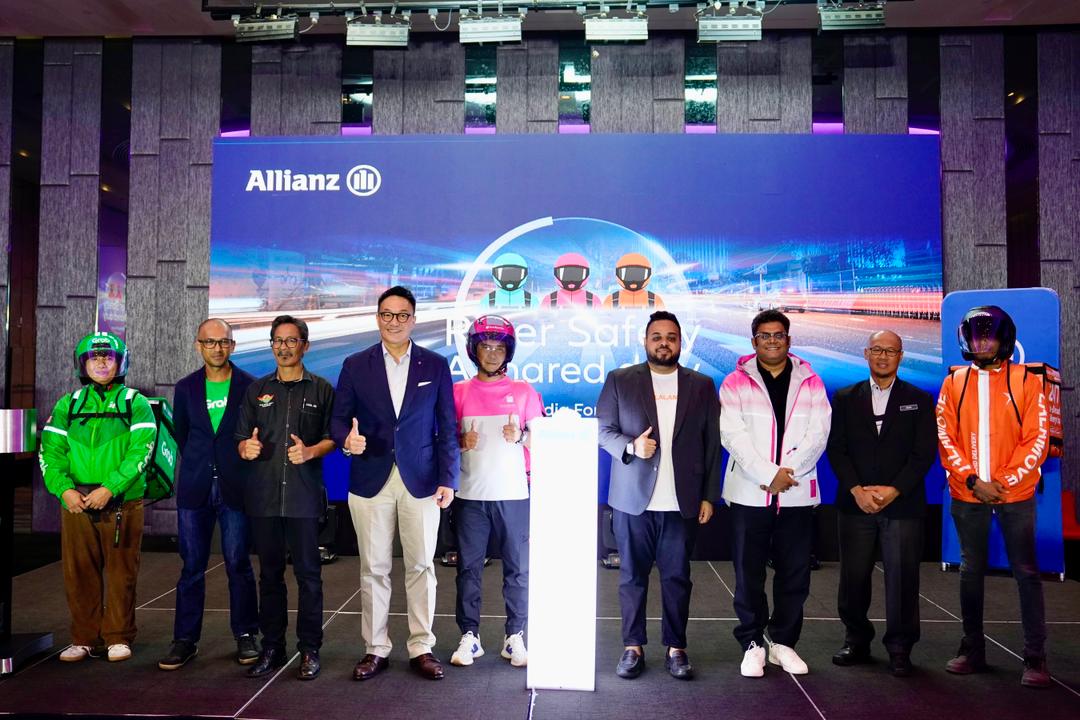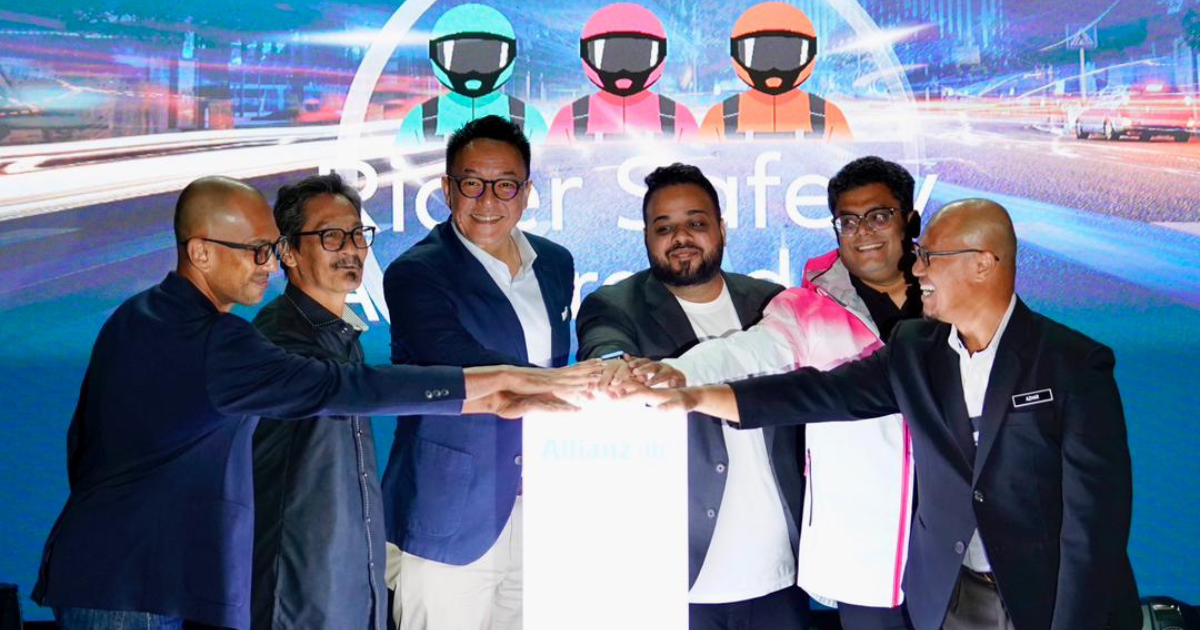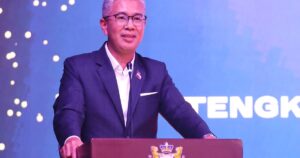“RIDERS are not just statistics. They are breadwinners. They are fathers, mothers, sons and daughters,” said Allianz Malaysia Bhd chief executive officer Sean Wang, urging Malaysians to look beyond the helmets and recognise the people behind them.
He called on Malaysians to rethink how they perceive p-hailing riders, urging society to recognise their contributions and prioritise their safety and dignity.
Speaking at the Allianz Malaysia Media Forum 2025 last Tuesday, Wang said the rising number of road accidents involving motorcyclists has made it impossible for him to remain passive.
He said the company’s latest initiatives are not just about insurance products, but about playing an active role in protecting those most vulnerable on Malaysian roads.
“When I see the data on fatalities and permanent disability going up, I cannot just sit in the office and process compensation claims. What is the point of all this data if I do nothing with it?” Wang said his motivation stemmed not from financial pressure, but from a moral responsibility to act.
He said Allianz Malaysia could no longer view rider safety as someone else’s problem.
“Our role cannot be just to collect money from the public and pay out claims. If I see that more and more riders are dying or becoming disabled, then I have a duty to step up and do more.”
The forum, themed “Rider Safety, A Shared Duty”, brought together stakeholders from the Malaysian Institute of Road Safety Research (Miros), Grab Malaysia, Lalamove Malaysia and foodpanda Malaysia.

The session explored how each party could play a role in protecting p-hailing riders, who now form the backbone of Malaysia’s gig economy.
“Without them, many of us would experience real inconvenience. Whether it is groceries, meals or urgent deliveries, they make modern life possible,” said Wang.
He added that society has grown dependent on the convenience these riders provide, but has done too little to improve their working conditions and safety.
“People complain when food arrives late, but rarely stop to think about what the rider had to go through just to get it there. These are the unsung heroes of our time.”
According to statistics from Miros, last year, motorcyclists accounted for 67.5 per cent of all road fatalities in Malaysia.
Motorcyclists typically spend more time on the road than average commuters, which increases their risk exposure.
In response, Allianz Malaysia is rolling out two new training programmes.
The first, developed in collaboration with the Road Safety Marshal Club, will focus on p-hailing rider survival and emergency response.
The second will target students at public and private universities, aiming to instil road safety values at a young age.
“These are not theoretical workshops. We want riders to learn what to do if a friend is bleeding or someone suffers a serious injury on the road. We aim to build confidence and preparedness so they do not panic in real emergencies,” Wang said.
He added that the training complements existing initiatives by platform companies and fills a crucial gap in community-level response.
“This is not just about selling insurance policies. This is about building trust and protecting livelihoods. Our goal is to empower these riders with knowledge that could one day save their lives or someone else’s.”
The panel discussion that followed saw frank assessments from industry players, including Grab Malaysia country operations and mobility director Rashid Shukor, foodpanda Malaysia operations director Shubham Saran and Lalamove Malaysia public affairs manager Abhishek Menon.
Rashid said many accidents involving riders occurred due to infrastructure gaps.
“Infrastructure is not built for the increasing number of riders. Road shoulders, lanes, lighting and visibility need serious improvement.”
He also suggested that the government look into reclassifying high-performance motorcycles used for delivery to ensure they meet safety standards.
Shubham said foodpanda had seen more accidents involving riders who had just joined the platform and had little on-the-road experience. To address this, the company introduced mandatory safety training modules must be completed before activation.
“We found that newly onboarded riders were more prone to accidents. With training and community outreach, we managed to cut down incidents by more than 20 per cent,” he said.
He added that support from insurers and regulators could help scale these programmes.
“We need stronger partnerships to reach more riders and drive awareness.”
Abhishek said Lalamove had prioritised quick claims processing for riders involved in accidents, sometimes settling them within 24 hours. But he agreed with other panellists that more must be done on the preventive front.
“There is no point in compensating families after the fact if we can stop the injury from happening in the first place. That is where we all need to put our focus.”
He also highlighted that many delivery riders struggle with the cost of high-quality personal protective equipment and suggested joint subsidies or sponsorships by corporates.
Wang praised their efforts and said Allianz Malaysia was open to further collaboration, including co-developing policy features that cater specifically to delivery riders’ working conditions.
“This is not a competition. The goal is safety. Let us come together to deliver more than just food and parcels. Let us deliver care, protection and peace of mind.”
Allianz General also introduced the Motorcycle Plus plan inspired by the late Datuk Seri Salahuddin Ayub’s Menu Rahmah initiative.
Wang said he had met the former minister before his passing, and the conversation left a lasting impression.
“I met the late Salahuddin, and he asked, ‘What can Allianz Malaysia do for the people?’ That moved me. We took that challenge seriously.”
The result was an enhanced protection plan aimed at lower-income motorcyclists, introduced without any additional cost.
“We gave better benefits without raising the price. Flat rate, no add-ons, but broader coverage. That was our way of honouring the Rahmah spirit,” he said.
He added that Allianz General had also expanded roadside assistance coverage to include motorcyclists, a service previously available only to car owners.
“Why should only four-wheel drivers get roadside assistance? Riders get stranded, too. They deserve the same dignity and access to help,” he said.
“We are proud to be leading this conversation, but we know we cannot do it alone. This is a shared journey. Everyone has a part to play.”
© New Straits Times Press (M) Bhd






